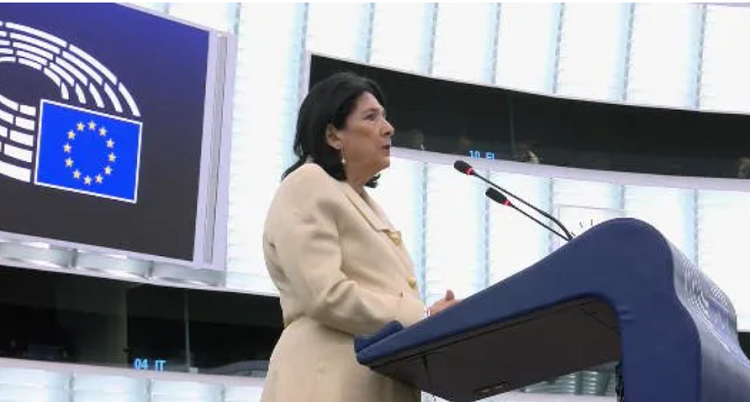Georgian President highlights “peaceful” protests for “European future”, “split” between Gov’t and people in EP address

The President praised the 21-day-long protests as a “unifying movement encompassing all layers of Georgian society”. Photo: video grab
Georgian President Salome Zourabichvili on Wednesday highlighted a “peaceful nature” of ongoing protests in the country against the Government's decision to suspend European Union accession talks until 2028, and accused the ruling Georgian Dream party of “diverging from the will of the people” in her address to the European Parliament.
Appearing at the body following an invitation by its President Roberta Metsola, Zourabichvili also accused the authorities of “aligning with Russian interests”, and using “repressive and violent” methods against “peaceful demonstrators”.
There are not two sides in Georgia”, Zourabichvili claimed, adding “on one side is the population of Georgia, and on the other side is the repressive apparatus of one party”.
The President praised the 21-day-long protests as a “unifying movement encompassing all layers of Georgian society”, sparked by “citizens’ demand for their stolen votes” in the October general elections and their “European future”.
She called the movement “peaceful civil disobedience” and dismissed notions of revolutionary intent.
This is not a revolutionary movement. It is about returning to free and fair elections”, Zourabichvili said, and urged the Government to heed the public's demand for democratic renewal through new vote.
In her speech, Zourabichvili accused the ruling party of steering the country onto a “Russian path” while “presenting a facade of European integration”.
The official linked the shift to 2019 events in Tbilisi, when Russian MP Sergey Gavrilov took the seat of the Georgian Parliament Speaker during a religious conference, sparking unrest in the country amid Russia’s ongoing occupation of Georgian territories.
Zourabichvili called the incident a “turning point” and also highlighted other signs of alleged divergence, which she said included the Government's withdrawal from an agreement brokered by Charles Michel, the European Council President, in 2021 to resolve a post-election tension in Georgia, its refusal to impose sanctions on Russia for invading Ukraine in 2022, introduction of “anti-Western” laws, including legislation on transparency of foreign influence in 2023 and 2024, and “widespread anti-Western rhetoric”.
The President claimed the GD authorities had accused the West of provoking the Russia-Ukraine conflict and accused the country’s foreign allies of “promoting LGBT propaganda” to “combat Georgia’s national values, religion and identity”.
Zourabichvili highlighted the Georgian people had “consistently demonstrated their commitment to Europe”, with “80 to 90 percent” favouring EU integration in polls since independence in 1991.
The courage and determination of the Georgian people show their commitment to freedom, Europeanness, and independence”, she said.
The President concluded by framing the protests as a “response to an existential crisis”, drawing parallels to Georgia’s “historical struggles for independence”.
She stressed the development was a “crucial moment”, telling the lawmaking body citizens of the country were “reacting to what they perceive as deprivation of their freedom, future, and, in some ways, independence”.
 Tweet
Tweet  Share
Share